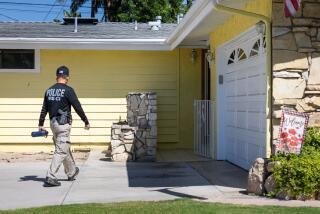Audit Says Gates’ Use of $335,061 on Bush Visit Was Legal
A county auditor’s report released Wednesday says that Sheriff Brad Gates spent $335,061 from his drug-fighting budget to pay for President Bush’s Orange County visit last April and that because the event was considered an “emergency” it did not require approval from the Board of Supervisors.
The report says the speedy and extensive work needed to prepare the remote canyon site called Rancho del Rio “required some creativity and bending of the rules at various times.” But it concludes that no state or county laws were broken.
“No one involved initially realized the actual extent of the work necessary to prepare for the president and the ultimate costs that would be involved,” Auditor-Controller Steven E. Lewis wrote in the report. “If management would have known the final cost figures, they probably would have acted differently and would have required more approvals and closer adherence to established procedures.”
Gates said the White House selected Rancho del Rio as a site for Bush’s visit because the 213-acre property was seized by authorities during a drug investigation. But turning the backwoods ranch near Ronald W. Caspers Wilderness Park into a one-time-only staging area for the president and 1,400 invited guests required extensive work on a 3.5-mile dirt road as well as the addition of telephone lines, electricity, toilets and furniture.
Lewis said the $335,061 he calculated does not include several thousand dollars in labor and equipment that was donated to the effort, including more than a dozen buses and drivers from the Marine Corps to transport guests.
All of the money was confiscated by the Sheriff’s Department during drug investigations. A 1984 federal law allows local law enforcement agencies to keep money they seize in narcotics investigations as long as it is spent to fight drugs. The U.S Department of Justice determined that Bush’s anti-drug speech was a proper use of the money.
Lewis said that the supervisors should have been asked to vote on the expense but that the lack of a vote did not violate proper procedures. Chief Assistant County Counsel Bill McCourt also said that the sheriff did not break any rules but that “if somebody sued us, then we’d go back and get it ratified” retroactively.
The report did not resolve one of the central questions surrounding the cost of the President’s visit--whether Supervisors Chairman Thomas F. Riley approved the plan. Gates has insisted that Riley endorsed the project, while Riley repeated Wednesday that he was never asked for his opinion.
Gates, who was unavailable for comment Wednesday, has said that he didn’t talk to any other supervisors and that he assumed they would be notified about the work by Riley. But none of the supervisors said they were aware of the extent of work being done at the site, and several said they were surprised when they saw the total cost.
“I think all of us would have swallowed several times if we knew (the cost) of what was happening,” Riley said Wednesday.
Riley disputed a phrase in the auditor’s report that said “the chairman of the Board of Supervisors endorsed the concept of the visit.” He also questioned a sentence that said, “We believe the board has granted a waiver of normal internal procedures for work done in preparation of the president’s visit.”
Trying to Avoid Problem
Riley said he will propose a county ordinance to avoid such problems in the future. He said the ordinance would implement a recommendation in the report that would require county agencies to describe the size of such projects to the supervisors and the County Administrative Office “prior to getting a formal or informal commitment to proceed.”
“In addition, top management of involved departments should be instructed to consult county counsel and reach agreement as to whether a true emergency exists,” the report says.
Under such an emergency, state law allows counties to ignore such rules as the requirement that purchases or labor be put out to bid.
The law defines an emergency as a “sudden, generally unexpected occurrence” that requires immediate action to prevent the loss of essential services or finances. County Counsel McCourt said, however, that court interpretations have expanded the definition to “cover any circumstance where it’s just not practical to go to bid.”
“As a practical matter,” McCourt said, “this may not be an emergency. But what are you going to do? Say to the President, ‘You can’t come because we have to go to bid’?”
The most significant work required to prepare Rancho del Rio was on the dirt road stretching to the site from Ortega Highway. The road, which was in such bad shape that it was impassable at places, required extensive grading and the addition of several tons of gravel so that Orange County Transit District buses could use it.
Normally, county rules might have required the board to approve that work. But Lewis’ report said the board approval could be waived if the work was considered maintenance rather than construction.
More to Read
Sign up for Essential California
The most important California stories and recommendations in your inbox every morning.
You may occasionally receive promotional content from the Los Angeles Times.










